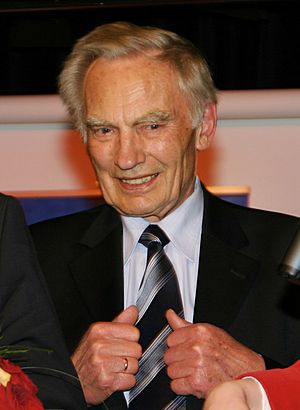Georg Kronawitter facts for kids
Quick facts for kids
Georg Kronawitter
|
|
|---|---|

Kronawitter in 2008
|
|
| Mayor of Munich | |
| In office 11 June 1972 – 4 March 1978 |
|
| Preceded by | Hans-Jochen Vogel |
| Succeeded by | Erich Kiesl |
| In office 18 March 1984 – 30 June 1993 |
|
| Preceded by | Erich Kiesl |
| Succeeded by | Christian Ude |
| Personal details | |
| Born | 21 April 1928 Schweitenkirchen, Bavaria, Germany |
| Died | 28 April 2016 (aged 88) |
| Political party | Social Democratic Party |
Georg Kronawitter (born April 21, 1928 – died April 28, 2016) was an important German politician. He was a member of the SPD, which is a major political party in Germany. Kronawitter served as the mayor of Munich, a big city in Germany, for two different periods: first from 1972 to 1978, and then again from 1984 to 1993.
Contents
Early Life and Education
Georg Kronawitter was born in Oberthann. This place is part of Schweitenkirchen, located in the Pfaffenhofen district of Germany. He started his career as an elementary school teacher in 1949. Later, in 1956, he earned a special certificate to become a business teacher.
His Political Journey
Kronawitter joined the SPD in 1961. This was the start of his long career in politics.
Becoming Mayor of Munich
In 1966, he was elected to the Landtag of Bavaria. This is like the state parliament in Bavaria. In 1972, he ran for mayor of Munich. He won the election with 55.9 percent of the votes. He took over from Hans-Jochen Vogel as mayor.
A Break and a Return
After his first term, Kronawitter did not run for mayor in 1978. This was because of some disagreements within his own party. Erich Kiesl from the CSU then became the new mayor.
However, six years later, Kronawitter ran for mayor again. On April 1, 1984, he won the election with 58.1 percent of the votes. He was re-elected in 1990 with an even higher percentage, 61.64 percent.
After Being Mayor
Even after he finished his time as mayor, Kronawitter stayed active. He strongly supported a special petition called Initiative-Unser-München. This petition was very successful. It made a rule that no new tall buildings in Munich can be higher than the Frauenkirche. The Frauenkirche is a famous church in Munich that is 99 meters (about 325 feet) tall.
Awards and Recognition
Georg Kronawitter received several honors for his work. In 1978, he was given the Ludwig-Thoma medal. This award recognizes people who have done great things.
In 1993, the city of Munich honored him. They recognized his strong dedication to making things fair for everyone. They also praised him for being aware of environmental issues early on. In July 2014, he received the "freedom of Munich prize." This award highlights the important work of political leaders.
See also
 In Spanish: Georg Kronawitter para niños
In Spanish: Georg Kronawitter para niños
 | Audre Lorde |
 | John Berry Meachum |
 | Ferdinand Lee Barnett |

